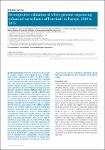Retrospective validation of whole genome sequencing-enhanced surveillance of listeriosis in Europe, 2010 to 2015
Van Walle, Ivo
Torgny Björkman, Jonas
Cormican, Martin
Dallman, Timothy
Mossong, Joël
Moura, Alexandra
Pietzka, Ariane
Ruppitsch, Werner
Takkinen, Johanna
European Listeria WGS typing group
Background and aim: The trend in reported case counts of invasive Listeria monocytogenes (Lm), a potentially severe food-borne disease, has been increasing since 2008. In 2015, 2,224 cases were reported in the European Union/European Economic Area (EU/EEA). We aimed to validate the microbiological and epidemiological aspects of an envisaged EU/EEA-wide surveillance system enhanced by routine whole genome sequencing (WGS).
Methods: WGS and core genome multilocus sequence typing (cgMLST) were performed on isolates from 2,726 cases from 27 EU/EEA countries from 2010–15. Results: Quality controls for contamination, mixed Lm cultures and sequence quality classified nearly all isolates with a minimum average coverage of the genome of 55x as acceptable for analysis. Assessment of the cgMLST variation between six different pipelines revealed slightly less variation associated with assembly-based analysis compared to reads-based analysis. Epidemiological concordance, based on 152 isolates from 19 confirmed outbreaks and a cluster cutoff of seven allelic differences, was good (sensitivity > 95% for two cgMLST schemes of 1,748 and 1,701 loci each; PPV 58‒68%). The proportion of sporadic cases was slightly below 50%. Of remaining isolates, around one third were in clusters involving more than one country, often spanning several years. Detection of multi-country clusters was on average several months earlier when pooling the data at EU/EEA level, compared with first detection at national level.
Conclusions: These findings provide a good basis for comprehensive EU/EEA-wide, WGS-enhanced surveillance of listeriosis. Time limits should not be used for hypothesis generation during outbreak investigations, but should be for analytical studies.

